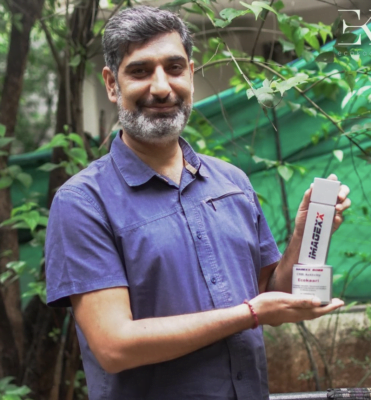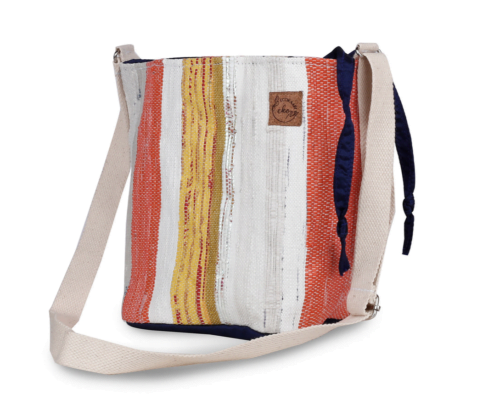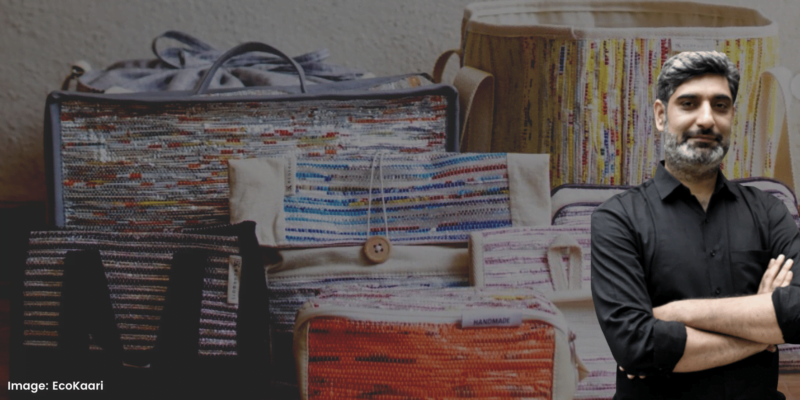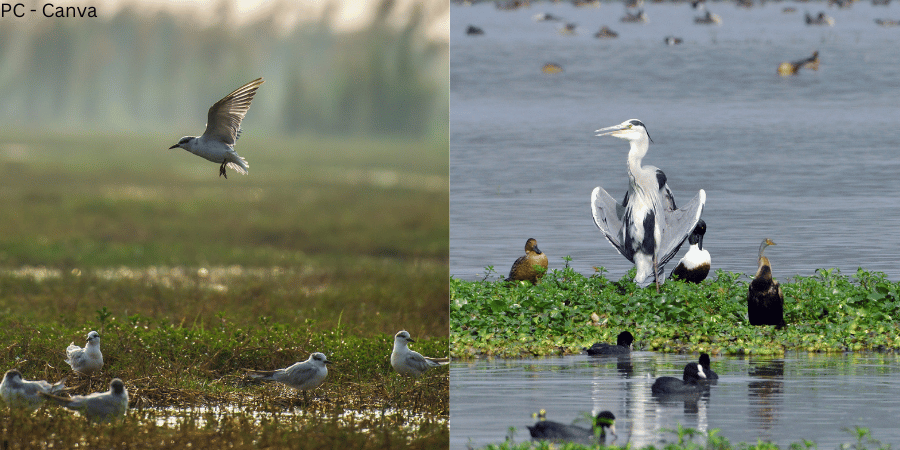Plastic Bags into the fabric, this start-up makes Rs 8 Lakh/month through EcoKaari, a Pune-based social enterprise run by Nandan Bhat, up-cycles plastic trash into handwoven fabrics with handlooms and wooden spindles.
Nandan Bhat began trekking with his friends in the early 2000s. He observed a change in the surroundings at several of the trekking locations he visited over time. He noticed that some such locations were becoming degraded as a result of tourists’ reckless disposal of plastic waste.
After some time, Nandan noticed that the majority of the plastic debris was in the form of bags rather than other plastic objects like bottles.
He began learning more about the problem, and as he did, he felt compelled to act autonomously.
Plastic Bags Into Fabric – This Start-Up Has Upcycled Over 20 Million Plastic

So, after a few tries and errors, Nandan founded EcoKaari in 2020. EcoKaari is a social enterprise that upcycles plastic trash into handcrafted fabrics using a handloom and wooden spindles (charkha), while also giving the local artists a means of subsistence.
The social venture now generates Rs 8 lakh in revenue each month and has prevented approximately 20 million plastic bags from ending up in landfills.
In 2013, Nandan left his corporate employment to pursue a career in corporate social responsibility (CSR) and decided to work in the management of plastic trash. He had an adequate opportunity during this time to be affiliated with several organizations that worked with the management of plastics.
The knowledge he gathered from his work let him establish his own venture EcoKaari, which converts plastic bags into fabric.
If you are conscious about the environment, then you should also read about other brands/people who are doing a fabulous job of fighting the plastic menace. Here are some of the notable startups that we have already covered in the past – Econiture, GreenPlast, Samudhyoga Waste Chakra, Decathlon, and Refillable Store.
This Man Left Corporate Job To Start EcoKaari

Nandan left his corporate employment in 2013 to begin working in the Corporate Social Responsibility (CSR) sector after resolving to work to end the management of plastic bags. He was able to join several organizations that worked with the management of plastics during this time because of the opportunities he had.
The social venture EcoKaari now generates Rs 8 lakh in revenue each month and has prevented approximately 20 million plastic bags from ending up in landfills.
He was inspired to launch his initiative by the experience he gathered from his work.
One of the government NGOs conceptualized the upcycling of marine plastic garbage by providing an alternative means of subsistence for the fishermen’s community in Ratnagiri. This gave him the idea to investigate upcycling by giving the less fortunate opportunities.
As a result, in Pune in 2015, Nandan launched his first firm with a colleague. They began the upcycling project by collaborating with a small number of households that we had trained to utilize handlooms. They used to provide them with the supplies, and they made the cloth at home, which they later collected. However, for whatever reason, the business plan didn’t work, thus they were forced to shut down the organization.
He didn’t want to give up, though. He, therefore, resumed the business using his remaining savings.
Later, in September 2020, he launched EcoKaari with the idea of protecting the environment by turning plastic trash into handwoven fabrics and supporting regional artists. ‘Eco’ means environmentally friendly, and ‘Kaari’ refers to craftsmanship, which symbolizes the two angles on which their firm EcoKaari is based.
There are currently 25 artisans employed by the company, who also mentions that they do their job from a unit in Warje, Pune.
Additionally, they have numerous export partners in diverse nations like Australia, Dubai, France, New Zealand, Singapore, the United Kingdom, and the United States.
Here Is What EcoKaari Make Out Of Upcycled Fabrics

The upcycled fabrics are utilized by EcoKaari to create everyday essentials including purses, accessories, home decor, and even office stationery products.
Collecting plastic debris from various locations is the first step in the process. However, they do not gather every kind of plastic since they are turning it into fabric. They concentrate on gathering or accepting single-use plastics such as polythene bags, multilayer wrappers, plastic gift wraps, and even used audio or video cassette tapes.
The entire process of manufacturing such repurposed products is done manually to create employment for craftsmen. The process starts with cleaning, sanitizing, and drying the plastic waste. They are then separated according to gauge and colour. They sort the plastic by colour since they keep the original colour and do not apply the dye.
If you like this story, you can also check out – Man Quits His Job In Dubai, Works for 20 Years to Create 4800 Plant Species Biodiversity Park
If you know about more inspirational stories about a person, company, new idea, or social initiative, and want us to write it on mad4india.com, share such information with us on Facebook or LinkedIn.



